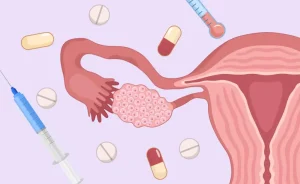Overview
Ovarian Hyperstimulation Syndrome (OHSS) is a medical condition that can occur as a complication of fertility treatments, particularly those involving injectable hormone medications to stimulate ovulation. OHSS causes the ovaries to become swollen and painful, and in severe cases, it can lead to fluid accumulation in the abdomen and chest, blood clots, and other serious complications. Early recognition and monitoring are important for safety.
Symptoms
Symptoms of OHSS can range from mild to severe, often developing within a few days to a week after fertility treatment:
-
Abdominal bloating or swelling
-
Pelvic pain or tenderness
-
Nausea or vomiting
-
Diarrhea
-
Rapid weight gain due to fluid retention
-
Shortness of breath in severe cases
-
Decreased urine output
-
Dizziness or lightheadedness
Causes
OHSS occurs when the ovaries over-respond to fertility medications, leading to increased vascular permeability and fluid shifts:
-
Excessive stimulation by injectable gonadotropins
-
High levels of estrogen during ovulation induction
-
Use of human chorionic gonadotropin (hCG) to trigger ovulation
-
Multiple developing follicles increasing ovarian response
Risk Factors
Certain factors increase the likelihood of developing OHSS:
-
Young age
-
Low body weight
-
Polycystic ovary syndrome (PCOS)
-
High doses of fertility medications
-
History of previous OHSS
-
High number of developing ovarian follicles during treatment
Complications
Severe OHSS can lead to serious health issues if not managed promptly:
-
Fluid accumulation in the abdomen (ascites) or chest (pleural effusion)
-
Blood clots due to thickened blood
-
Kidney or liver dysfunction
-
Electrolyte imbalances
-
Shortness of breath or difficulty breathing
-
Hospitalization may be required in severe cases
Prevention
Preventive strategies focus on reducing ovarian overstimulation and monitoring during fertility treatment:
-
Using the lowest effective dose of fertility medications
-
Careful monitoring of ovarian response through ultrasound and blood tests
-
Avoiding hCG trigger in high-risk patients, using alternative medications
-
Adjusting treatment protocols for women with PCOS or high ovarian reserve
-
Prompt reporting of symptoms such as sudden weight gain or abdominal pain
Advertisement

